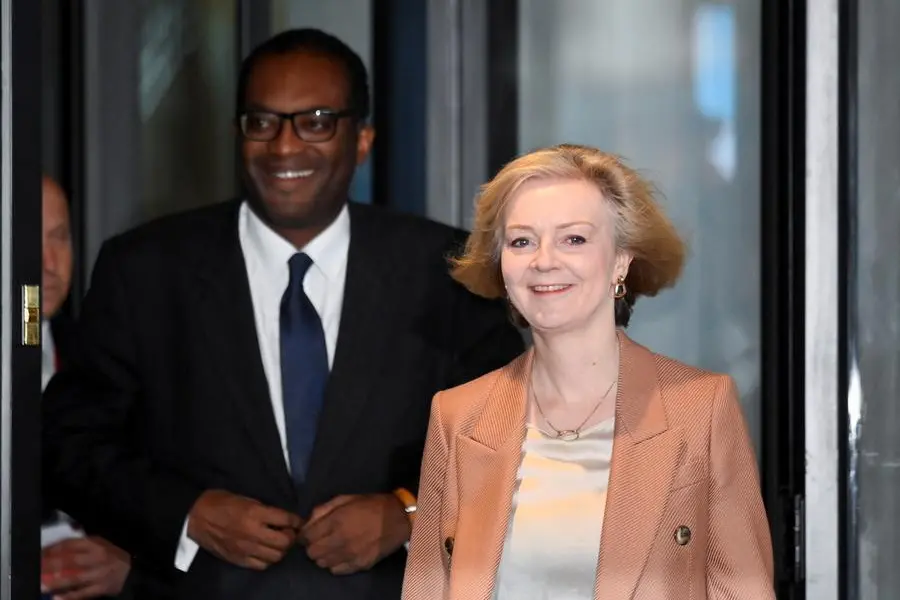PHOTO
BIRMINGHAM, England - Prime Minister Liz Truss will on Wednesday press her message that Britain needs "to do things differently" to kickstart stagnant growth, using her first speech to the party faithful as Conservative leader to try to restore her dwindling authority.
Weakened after being forced into a U-turn on one of her tax cuts less than 24 hours into her Conservative conference, Truss will double down on her message that her plan is the right one to tackle the long list of problems facing Britain.
But with lawmakers empowered after forcing one reversal of her policy to scrap the top rate of tax, she faces a fight to get other, as yet ill-defined, planks of her agenda through parliament, possibly not only diluting her "radical" agenda but also raising suggestions of an early election.
Seemingly undeterred, Truss will tell party members and lawmakers that she will build a "new Britain for the new era", repeating that her government believes that decisive action -- never mind the "disruption" - is the right route to take.
"For too long, the political debate has been dominated by how we distribute a limited economic pie. Instead, we need to grow the pie so that everyone gets a bigger slice," she will tell the party in the central English city of Birmingham.
"That is why I am determined to take a new approach and break us out of this high-tax, low-growth cycle."
The conference, once expected to be her crowning glory after being appointed prime minister on Sept. 6, has quickly become more of a nightmare after her plan of 45 billion pounds ($51 billion) of unfunded tax cuts triggered market turmoil and she was forced to reverse course on scrapping the highest tax rate.
The markets have largely stabilised after Britain's central bank, the Bank of England, stepped in with a package worth billions of pounds to shore up the bond market, though borrowing costs remain higher than before the tax plans were set out on Sept. 23.
A government source also suggested her finance minister, Kwasi Kwarteng, was considering bringing forward his medium-term fiscal plan - showing how the so-called "growth plan" of tax cuts and spending will be funded to try to calm the markets.
CHANGE MEANS DISRUPTION
Truss will reiterate on Wednesday that her government will keep "an iron grip" on Britain's finances, and will set out her belief in fiscal responsibility, value for money for the taxpayer, sound money and a smaller state, her office said.
Her critics say she is relying on the discredited ideology of "trickle-down" economics that will only widen inequality in society and fail to provide investment in the short term.
It is not an argument Truss accepts and she will admit on Wednesday that "not everyone will be in favour" of her changes, a possible warning that the reforms she intends to bring in to spur investment and cut spending might not be palatable to all.
Some lawmakers fear she will break a commitment to increase benefit payments in line with inflation, something they argue would be inappropriate at a time when thousands of families are struggling with soaring prices.
Truss has said her government has yet to take a decision on benefits payments and ministers say they are obliged to look at the numbers later this month.
With opinion polls showing the Conservative Party trailing the main opposition Labour Party badly and facing a possible wipeout if there was an early election, several lawmakers feel there is no easy option to restore their standing.
Some say the risk is that the Conservatives again become "the nasty party" - a moniker coined by a senior party figure 20 years ago when it was in a long period of opposition.
But Truss will again say there is one way to boost the party, and that is "to do things differently" to secure growth.
"Whenever there is change, there is disruption. Not everyone will be in favour," she will say. "But everyone will benefit from the result - a growing economy and a better future. That is what we have a clear plan to deliver."
($1 = 0.8757 pounds)
(Reporting by Elizabeth Piper Editing by Mark Heinrich)





















